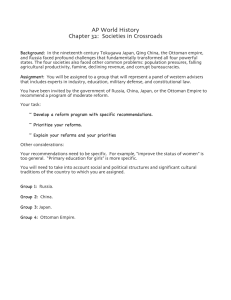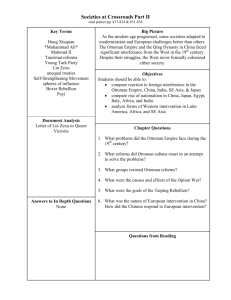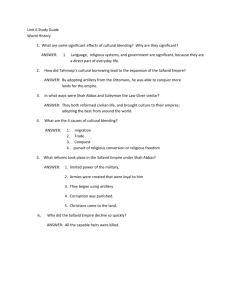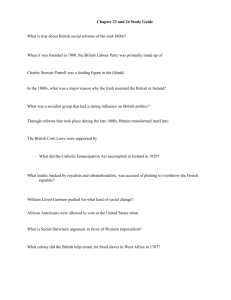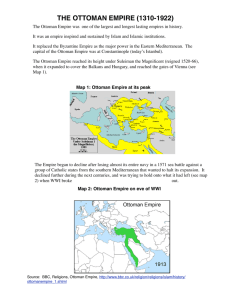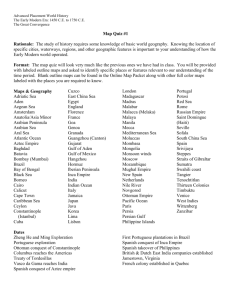Factors in Rise of Ottoman Empire
advertisement
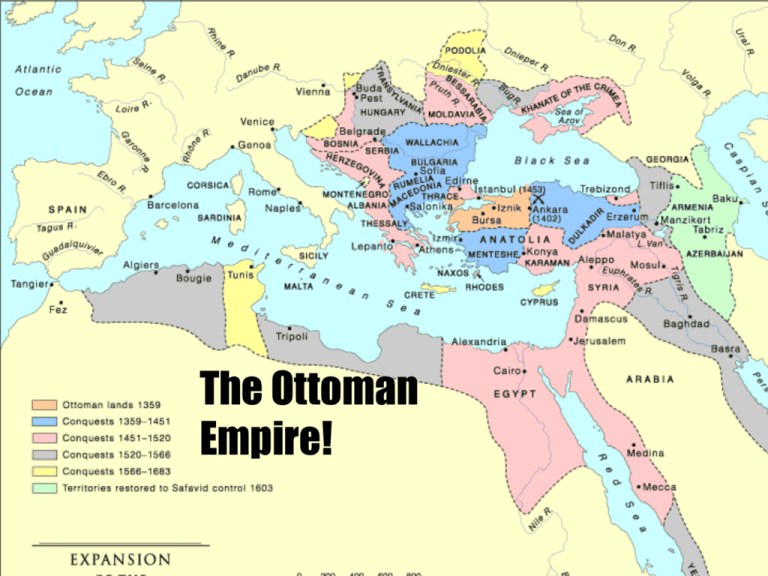
The Ottoman Empire! Common Characteristics of ALL Muslim Empires • land empires oriented toward military conquest • inward orientation (trading within cultural areas) • dominant religion – Islam • multilinguistic and multicultural • traditional military reliance on cavalry Factors in Rise of Ottoman Empire • control of link between Europe and Asia on the Dardanelles strait • military power -Janissaries • growth primarily by land conquest Key Ottoman Rulers • Osman(1258-1324) and his descendants -founder of the Ottoman dynasty -Turkish leader -His descendants built the Ottoman Empire. • Mehmet II (the Conqueror)(1451-81) -Constantinople (Istanbul) • Suleyman (the Magnificent) (1520-66) Famous Leaders • Osman Suleiman the Mag Mehmet II Progress in the Rise and Expansion of the Ottoman Empire • crystallization of the empire at the end of the 13th century in a crucible of Mongol warfare • expansion into southeastern Europe, particularly the Balkans and Greece • conquest of Constantinople in 1453 • Selim I’s expansion into northern Africa and against the Safavid Empire • high point of the empire during the reign of Suleyman the Magnificent (r. 1520-66) • empire’s extension into: southern and eastern Europe, the Middle East, and northern Africa • Ottoman efforts to dominate the Mediterranean Sea • unsuccessful Ottoman sieges of Vienna (Central Europe) in 1529 and 1683 Factors in the Decline of the Ottoman Empire • slow decline from 1566 (loss of territory) • series of incompetent sultans • corrupt members of elite (Janissaries) • Western ideas and customs Characteristics of the Safavid Empire • Persian cultural foundation (present day Iran) • predominantly Shi’ite (descendants of Muhammad rule) Key Events in the Rise and Fall of the Empire • empire formed by Shah Ismail in 1501 • 1514 Battle of Chaldiran – inconclusive Ottoman victory • collapsed in 1722 in the face of invading Afghans • briefly revived by Nader Shah(r. 173647), but too much pressure from outside forces and internal forces. Key Rulers of the Safavid Empire • Shah Ismail (r. 1501-1524) -Kurdish, Iranian, and Greek ancestry -hereditary leader of a militant Sufi -brotherhood called Safaviya • Shah Abbas "the Great"(1588-1629) -Persian version of Suleyman -built Persia’s first standing army -regained territory formerly lost to the Ottoman Empire -after Abbas’s rule, Empire collapses (invading Afghan tribesmen)
